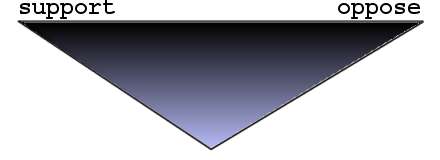'Copyright law should be abolished entirely. No one can legitimately own creative works.'
[ support:0% : certainty:0 ] · [9 replies] ·
[0 comment]

|
supporting arguments
0% ·
[make argument]
0%
· information age
by metric on 2005-05-05 15:57:16
People should be paid for creating information, not for owning it.
This would naturally occur if copyright didn't exist.
by anticopyright on 2005-05-05 18:27:09
If there weren't copyright, virtually every person
would have access to the entirety of human culture.
(at least in industrialized areas.) |
opposing arguments
0% ·
[make argument]
0%
· We own our thoughts
by anonymous on 2005-08-14 20:33:09
As human our entire development is crafted from individual experiences. With that the thoughts we derive are uniquely our own. I believe it has been proven that two people that witness the same thing come to two different conclusion about what happened. I believe the samething is true of intellectual property, when we create something, it is ours, we created it with the thoughts we have. All copyright law does is protect the intellectual property from being ripped off and sold as someone else invention. It protects my rights to sell my intellectual property, and recover monetary damages from people who pass my work off as their own.
by seraphblade on 2005-09-29 19:20:50
Copyright could be changed to provide its same benefits (incentive to create) while removing its harmful and very real costs to society present in its current form:
-Shorter term-most creative work has, within 5 years, either made a profit or never will. Copyright should not be longer then this, then-it still would provide financial incentive without providing an excessively long restriction term. -Returning to mandatory registration would eliminate the problems of "orphan works" and "untraceable holders"-anyone who wishes to present a work commercially would make use of a free and easy registration system, while allowing use to be made of the work of those who do not choose to explicitly register. -Copyright should be considered an industrial regulation preventing unlicensed commercial use, not a restriction on individual consumers. |
Powered by Debatepoint.
All text is available under the terms of the GNU Free Documentation License.